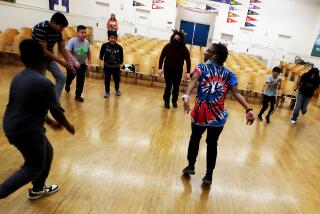At a Super Bowl party, game-changing ideas about education
While most Super Bowl viewers were stuck at halftime with Day-Glo dancers and hip-hop singers, the guests at Gary and Cherna Gitnick’s Super Bowl party got to listen to a panel of city leaders pontificate on the problems facing city schools.
It was about as entertaining as it sounds. Eleven experts, 45 minutes, and a moderator whose first question was as broad and unwieldy as the Los Angeles school system: How do we develop the school district’s infrastructure so that it is efficient, respects parent input, and promotes high school graduation and college enrollment?
But the subject itself was more important than anything we missed on the television screen. And the Super Bowl was a fitting venue for the inquiry.
Education has become a political football in Los Angeles. Teachers, parents and politicians are vying for points on campus grabs, unions are blocking ground-gaining reforms, charter schools are relying on end-arounds, and business leaders are bankrolling their own game plans.
Gary Gitnick — a UCLA physician and creator of the Fulfillment Fund, a legendary student mentoring program — was Sunday’s moderator, coach and referee. His annual Super Bowl party at his Encino home is a fixture on the social calendar of Los Angeles business and political elite.
This year his halftime panel included members of the Los Angeles Unified school board, the City Council and the board of county supervisors, as well as the city attorney, teachers union president, state school superintendent and incoming head of LAUSD.
Gitnick was probing for inspiration: How do we get from idea to practice in time to help this generation of students? But these were politicians, with pet projects, predictable agendas and few flashes of contrarian thinking.
Councilman Paul Krekorian suggested the district lower its utility bills by partnering with the DWP. County Supervisor Zev Yaroslavsky stressed the need for better healthcare and safer streets. Councilwoman Jan Perry touted concerts and museum visits for inner-city kids.
And everyone on the panel seemed to agree that things will get better if we just believe.
“This is about a will, a belief system,” declared school board President Monica Garcia. “We bring partners, we bring purpose; we say all kids can learn and we mean it.”
They settled on a laudable goal: Every student pointed toward college, with rigorous classes and supportive teachers.
How do you make that happen in a district where the status quo seems to be 35 kids in an algebra class, taught by an exhausted, disillusioned teacher, on a crowded campus run by a principal preoccupied with what test scores say and whether metal detectors are working?
And let’s say the school board mantra works, and those children manage to find their way to college. They’ll be banging on the doors of overflowing classrooms, begging professors to find them seats. And searching for nonexistent jobs to pay perpetually rising tuition and fees.
Because that same funding crisis hobbling public schools is putting college off limits for countless students. We have to prepare them for life, not just school; help cultivate discipline, patience, persistence.
Unless we can go beyond “college for all” as our district’s rallying cry, we’ll keep shortchanging too many young people.
Still, there was something inspiring about the vigorous support for public schools among the scores of well-heeled guests who passed up the halftime show on the Gitnicks’ big screen to crowd the patio and listen.
City Atty. Carmen Trutanich received a burst of applause when he suggested longer school days and the addition of “life skills” classes for children as young as first grade. Students need to understand their own role in becoming successful, he said.
“Decision-making, right from wrong. Do your homework, stay out of a gang…. They can tell you the kind of lifestyle they want, but they don’t know how to get there,” he said.
And City Controller Wendy Greuel gave a shout-out to principals, reminding us of their importance in determining what a school becomes. The academic performance index score at her daughter’s North Hollywood elementary school shot up by more than 300 points under a dynamic new principal.
“We need to focus on good principals and give them the resources they need,” she said.
Her point was a reminder of what a team effort education is. And watching the players on the dais on Sunday, I think I saw the glimmer of the beginning of a most unlikely team.
Seated next to each other were Deasy and Duffy — John Deasy, the incoming superintendent of LAUSD, and A.J. Duffy, the outgoing president of UTLA, the Los Angeles teachers union.
The two constituencies — district and union — always manage to approach each issue from opposite sides of the playing field. They inched closer on Sunday, it seemed … even if cooperation was all in the hearing.
Gitnick asked both men what it will take to move this district from dreams of success to reality.
Duffy wants control ceded to teachers, parents and administrators, he said, with the district reduced to “nothing more than a conduit for resources to schools.”
Deasy promises a “leaner, more agile central office, pushing resources out to schools.” But he also wants a “thin” union contract, so campuses can select their own staffs without being bound by seniority provisions.
Duffy railed against merit pay, doled out only to outstanding teachers. But he committed to a program of “counseling out” ineffective instructors. “In a reasonable amount of time,” he insisted.
Deasy apparently heard something different, and congratulated his union counterpart. “I’m glad he’s going to partner with us to rapidly remove low-performing teachers.”
Ineffective or low-performing? Reasonable amount of time or rapidly? Maybe they’ve finally decided to stop parsing words and focus on children in need.
More to Read
Sign up for Essential California
The most important California stories and recommendations in your inbox every morning.
You may occasionally receive promotional content from the Los Angeles Times.










